必修二unitMusic教育教学设计
必修2 unit 5 music 教学设计与反思.doc
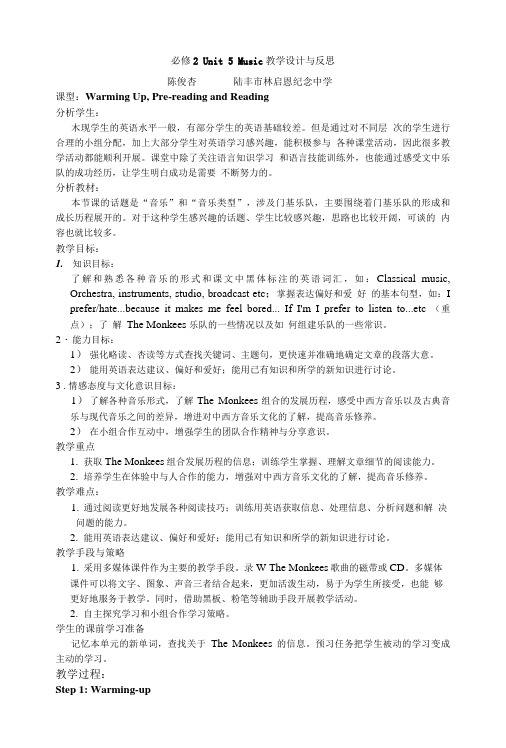
必修2 Unit 5 Music教学设计与反思陈俊杏陆丰市林启恩纪念中学课型:Warming Up, Pre-reading and Reading分析学生:木现学生的英语水平一般,有部分学生的英语基础较差。
但是通过对不同层次的学生进行合理的小组分配,加上大部分学生对英语学习感兴趣,能积极参与各种课堂活动,因此很多教学活动都能顺利开展。
课堂中除了关注语言知识学习和语言技能训练外,也能通过感受文中乐队的成功经历,让学生明白成功是需要不断努力的。
分析教材:本节课的话题是“音乐”和“音乐类型”,涉及门基乐队,主要围绕着门基乐队的形成和成长历程展开的。
对于这种学生感兴趣的话题、学生比较感兴趣,思路也比较开阔,可谈的内容也就比较多。
教学目标:1.知识目标:了解和熟悉各种音乐的形式和课文中黑体标注的英语词汇,如:Classical music, Orchestra, instruments, studio, broadcast etc;掌握表达偏好和爱好的基本句型,如:I prefer/hate...because it makes me feel bored... If I'm I prefer to listen to...etc (重点);了解The Monkees 乐队的一些情况以及如何组建乐队的一些常识。
2・能力目标:1)强化略读、杏读等方式查找关键词、主题句,更快速并准确地确定文章的段落大意。
2)能用英语表达建议、偏好和爱好;能用已有知识和所学的新知识进行讨论。
3 .情感态度与文化意识目标:1)了解各种音乐形式,了解The Monkees组合的发展历程,感受中西方音乐以及古典音乐与现代音乐之间的差异,增进对中西方音乐文化的了解,提高音乐修养。
2)在小组合作互动中,增强学生的团队合作精神与分享意识。
教学重点1.获取The Monkees组合发展历程的信息;训练学生掌握、理解文章细节的阅读能力。
必修二第五单元music教案

必修二第五单元music教案1.教学目标:1.1知识与技能:学生能听懂并使用表示音乐的词汇;能较准确地描述音乐类型和文化背景;能就音乐审美主张表达个人观点。
1.2过程与方法:采用启发式教学法,引导学生自主思考;采用听、说、读、写、演等多种教学方法进行教学;通过讨论、演示等方式加深学生对音乐的理解。
1.3情感态度价值观:培养学生对音乐的热爱、感受音乐的美感;引导学生客观、理性地审美,培养学生应该有自己的审美观。
2.教学重点难点2.1掌握有关音乐类型和文化背景的表达方法,学会语言交际。
2.2提高学生的跨文化交际能力。
3.教学过程3.1暖身环节引入下文主题,可以与学生分享一首他们喜欢的音乐,介绍歌曲类型、文化背景和演唱者等。
3.2输入环节通过展示视频和图片等方式来主题音乐的类型和背景等(例如摇滚乐、传统音乐、爵士乐等等),学生通过观看背景图和听取音乐鉴别不同的音乐类型。
然后与学生讨论各种类型音乐和文化背景的关系,并竣工讨论。
3.3实践与运用进行一个小组作业,让学生组成3-4人的小组,选择一个音乐类型并作一份10分钟的介绍PPT。
输出点:档次的文件,图片和美术创意等。
这样,学生可以进一步分析和交流有关音乐类型和文化背景方面的细节,培养同伴间的合作与学习对话能力。
3.4综合评价在教学的最后,通过口头交流的方式,让学生跨组交流彼此的发现和体会。
对小组和个人表现进行评价和点评,以便针对学生的不同表现安排合适评分标准(例如,个人发言时间、贡献度、团队沟通交流等)。
4.教学评价4.1教学效果评价:通过测试和小练习考察学生对不同音乐类型和文化背景的理解掌握情况。
4.2教学过程评价:检视和总结教学过程中学生的参与度和互动情况,以提高今后的教学质量和效果。
4.3教学方法与手段评价:评估启发式教学法等多种教学方法和手段的使用情况,以便今后的教学设计和改进。
5.教学反思在这一单元教学过程中,尤其是在小组讨论环节,教师具体指导学生进行互动和讨论,以增加学生的积极性和参与度。
高中英语必修二unit5music教学设计方案
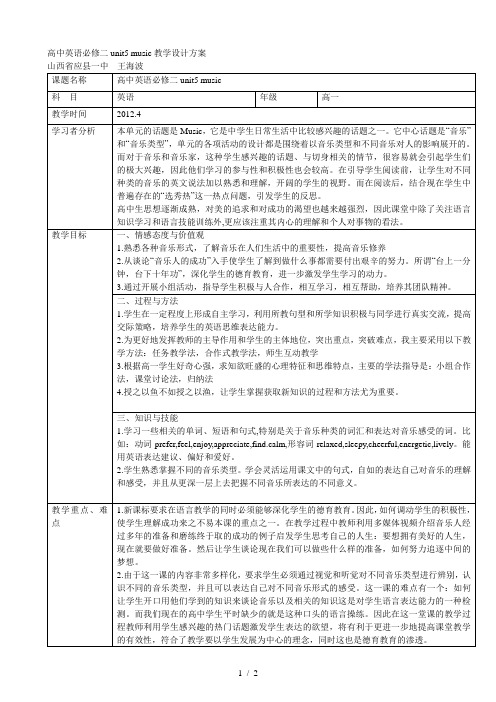
老师将有用的词汇和句式制作在一张比较大的纸上,贴在黑板的中央,让学生运用这些词汇进行讨论,此环节的设置紧扣上面,帮助学生进行表达,加强对词汇和句式的运用。
3、让一些同学阐述自己对音乐的看发,表达自己对某种音乐的感受。
3.根据高一学生好奇心强,求知欲旺盛的心理特征和思维特点,主要的学法指导是:小组合作法,课堂讨论法,归纳法
4.授之以鱼不如授之以渔,让学生掌握获取新知识的过程和方法尤为重要。
三、知识与技能
1.学习一些相关的单词、短语和句式,特别是关于音乐种类的词汇和表达对音乐感受的词。比如:动词prefer,feel,enjoy,appreciate,find.calm,形容词relaxed,sleepy,cheerful,energetic,lively。能用英语表达建议、偏好和爱好。
教学活动5
五、课后活动和作业
课后活动:同学之间谈论一下各自喜欢的音乐,可以各自为对方展示一段音乐。课后作业:写一篇小作文。内容是关于你喜欢的一个音乐人。可以从喜欢他或她的原因,小故事,或者经历写起。写完后,同学之间互相修改,互相提高。
高中生思想逐渐成熟,对美的追求和对成功的渴望也越来越强烈,因此课堂中除了关注语言知识学习和语言技能训练外,更应该注重其内心的理解和个人对事物的看法。
教学目标
一、情感态度与价值观
1.熟悉各种音乐形式,了解音乐在人们生活中的重要性,提高音乐修养
2.从谈论“音乐人的成功”入手使学生了解到做什么事都需要付出艰辛的努力。所谓“台上一分钟,台下十年功”,深化学生的德育教育,进一步激发学生学习的动力。
2.学生熟悉掌握不同的音乐类型。学会灵活运用课文中的句式,自如的表达自己对音乐的理解和感受,并且从更深一层上去把握不同音乐所表达的不同意义。
重庆高中英语必修二 Unit5《Music》全套教案
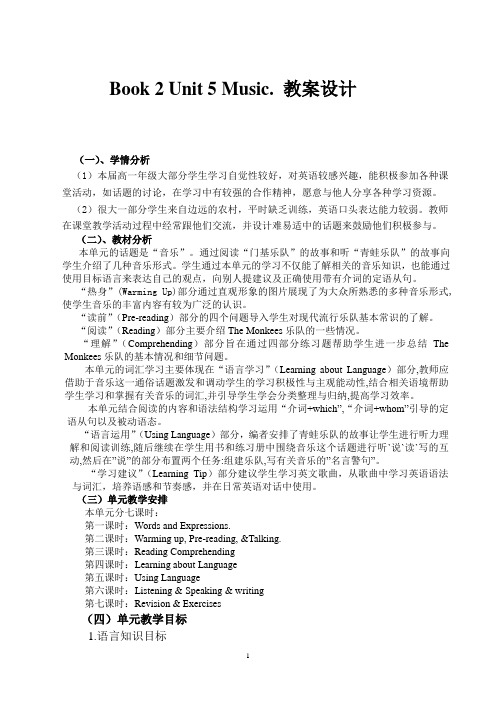
Book 2 Unit 5 Music. 教案设计(一)、学情分析(1)本届高一年级大部分学生学习自觉性较好,对英语较感兴趣,能积极参加各种课堂活动,如话题的讨论,在学习中有较强的合作精神,愿意与他人分享各种学习资源。
(2)很大一部分学生来自边远的农村,平时缺乏训练,英语口头表达能力较弱。
教师在课堂教学活动过程中经常跟他们交流,并设计难易适中的话题来鼓励他们积极参与。
(二)、教材分析本单元的话题是“音乐”。
通过阅读“门基乐队”的故事和听“青蛙乐队”的故事向学生介绍了几种音乐形式。
学生通过本单元的学习不仅能了解相关的音乐知识,也能通过使用目标语言来表达自己的观点,向别人提建议及正确使用带有介词的定语从句。
“热身”(Warming Up)部分通过直观形象的图片展现了为大众所熟悉的多种音乐形式,使学生音乐的丰富内容有较为广泛的认识。
“读前”(Pre-reading)部分的四个问题导入学生对现代流行乐队基本常识的了解。
“阅读”(Reading)部分主要介绍The Monkees乐队的一些情况。
“理解”(Comprehending)部分旨在通过四部分练习题帮助学生进一步总结The Monkees乐队的基本情况和细节问题。
本单元的词汇学习主要体现在“语言学习”(Learning about Language)部分,教师应借助于音乐这一通俗话题激发和调动学生的学习积极性与主观能动性,结合相关语境帮助学生学习和掌握有关音乐的词汇,并引导学生学会分类整理与归纳,提高学习效率。
本单元结合阅读的内容和语法结构学习运用“介词+which”,“介词+whom”引导的定语从句以及被动语态。
“语言运用”(Using Language)部分,编者安排了青蛙乐队的故事让学生进行听力理解和阅读训练,随后继续在学生用书和练习册中围绕音乐这个话题进行听`说`读`写的互动,然后在”说”的部分布置两个任务:组建乐队,写有关音乐的”名言警句”。
人教 新课标必修二英语Unit 5Music【教学设计】

Unit 5 Music本单元“Music”是高中英语教材中与英语学习相关的一重要话题,也是新课标文化意识的一个重要组成部分。
“阅读”部分主要介绍了门基乐队的成长过程。
文章先介绍了一个乐队形成的通常过程:在课堂设计中先通过视频导入,然后通过快速阅读让学生了解文章主旨大意,锻炼学生的快速提取信息能力。
然后再进行细节阅读,以前两段为一个整体,来设置问题。
锻炼学生对细节信息的定位能力。
在第三、四段又描述了一支有特殊成长经历的门基乐队,一次失败的电视选秀,一支流行乐队的诞生。
对于第三、四段设置排序题目对乐队的形成过程有一个清晰的轮廓,这个乐队在中国并不为大多数人所熟悉,但他们独特的音乐风格和成名经历使他们在乐坛上独树一帜。
更重要的是,乐队成员从平民到明星的过程能让学生产生共鸣,并引发学生对“明星梦”的反思。
能通过对门基儿乐队的学习。
初步了解英语国家的文学家、艺术家、科学家等成就、贡献等。
1.Knowledge objectives:1)学会使用课标要求的次回合习惯用语或固定搭配,学生能够正确读写及运用重点单词和词组2)使用适当的语言形式描述事物、简单地表达观点、态度或情感,学生能够认出并运用介词+which/whom 的定语从句的语法。
2.Ability objectives:1)能理解文章主旨和作者意图。
能通过上下文客服生词困难,理解语篇意义。
2)强化略读、查读等阅读技能,训练通过寻找关键词,主题句等方式更快速并准确地确定文章的段落大意,理清文章的总体框架与脉络。
3)继续运用已经掌握的基本猜词技巧猜测文章中的部分单词。
4)能在小组讨论后用英语表达出乐队的形成过程。
3.Emotion and culture objectives:1)了解各种音乐形式,了解The Monkees组合的发展历程,接触不同地区的音乐,深化对音乐的认识,提高音乐素养。
2)在小组合作互动中,增强学生的团队合作精神与分享意识。
3)能通过对门基儿乐队的学习。
外研版高中英语必修二《Music》优质课公开课课件、教案

外研版高中英语必修二《Music》优质课公开课课件、教案Module 3 MusicI.教学内容分斩本模块以“Music”为话题。
学生通过本模块的学习可以了解古今中外的音乐家,提高他们的音乐欣赏水平,培养他们对音乐的评价和鉴赏能力,从而丰富学生的音乐知识,提高学生的艺术修养。
Introduction部分通过设计的两个活动让学生复习和学习一些常见的乐器的名称,激发学生学习本模块的兴趣。
Reading and Vocabulary该部分向同学们介绍了音乐家海顿、莫扎特和贝多芬以及他们的伟大成就。
让同学们在阅读的过程中了解音乐家的奋斗历程,树立正确的人生观和价值观。
通过相关的活动,训练学生的综合语言能力。
Grammar 1学习并巩固时间状语从句。
Writing要求学生阅读一封外国朋友的电子邮件,并根据问题写一封回信。
Function通过回答问题和完成句子让学生懂得如何表达喜好和厌恶,从而初步培养学生的鉴赏能力。
Listening and Vocabulary首先通过听力活动帮助学生了解和学习有关英国乐队The Beatles的背景知识,接着让学生学习新的词汇。
在训练学生听力的同时考查学生的理解能力。
Grammar 2复习过去完成时态。
通过练习帮助学生巩固过去完成时态的基本用法。
Pronunciation学会如何在日常交际中使用升调和降调。
Everyday English要求学生掌握表达喜好的一些用语和有关音乐的日常用语。
Cultural Corner学习一篇有关著名作曲家叶小刚的文章,了解他的音乐经历和音乐成就,增强学生的民族自豪感。
Task训练学生仿写一篇介绍著名音乐家生平和作品的文章。
Module File对整个模块的学习内容进行归纳总结,有助于学生对所学知识进行复习和巩固。
II.教学重点和难点1.教学重点(1)本模块的生词和短语。
(2)弄清楚时间状语从句和过去完成时态的用法。
(3)谈论有关音乐的话题。
人教版高中英语必修第二册 《Unit 5 Music》教案
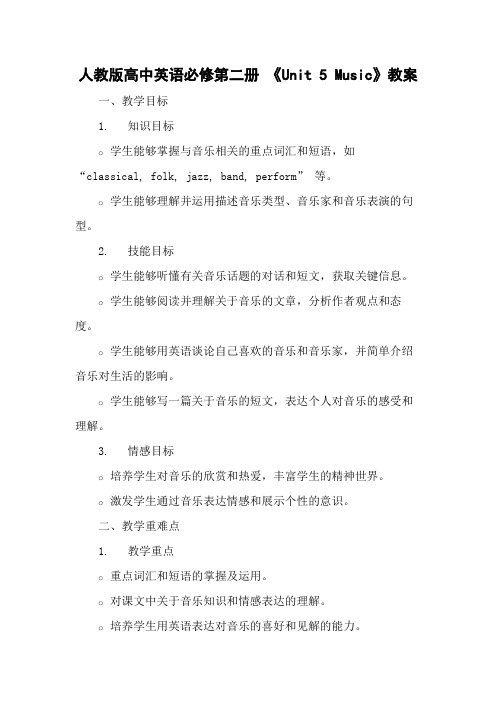
人教版高中英语必修第二册 《Unit 5 Music》教案一、教学目标1.知识目标o学生能够掌握与音乐相关的重点词汇和短语,如 “classical, folk, jazz, band, perform” 等。
o学生能够理解并运用描述音乐类型、音乐家和音乐表演的句型。
2.技能目标o学生能够听懂有关音乐话题的对话和短文,获取关键信息。
o学生能够阅读并理解关于音乐的文章,分析作者观点和态度。
o学生能够用英语谈论自己喜欢的音乐和音乐家,并简单介绍音乐对生活的影响。
o学生能够写一篇关于音乐的短文,表达个人对音乐的感受和理解。
3.情感目标o培养学生对音乐的欣赏和热爱,丰富学生的精神世界。
o激发学生通过音乐表达情感和展示个性的意识。
二、教学重难点1.教学重点o重点词汇和短语的掌握及运用。
o对课文中关于音乐知识和情感表达的理解。
o培养学生用英语表达对音乐的喜好和见解的能力。
2.教学难点o如何帮助学生准确运用丰富的词汇和句型描述音乐。
o引导学生深入理解音乐的内涵和价值。
三、教学方法1.视听教学法:通过播放音乐、视频等让学生直观感受音乐的魅力。
2.讨论交流法:组织学生讨论音乐相关话题,促进学生思维碰撞和语言表达。
3.情景创设法:创设音乐场景,让学生在情境中学习和运用语言。
四、教学过程(一)导入(5 分钟)1.播放一段不同类型的音乐片段,如古典音乐、流行音乐、摇滚音乐等。
2.提问学生:What kinds of music do you hear? How do they make you feel?(二)词汇教学(10 分钟)1.展示本单元的重点词汇和短语,结合音乐实例进行讲解。
2.开展词汇游戏,如音乐词汇猜猜猜,加强学生对词汇的记忆和理解。
(三)阅读前准备(5 分钟)1.让学生观察课文标题和图片,预测文章内容。
2.提出一些引导性问题,如:What do you think thepassage will be about music?(四)课文阅读(15 分钟)1.学生快速阅读课文,概括文章的主要内容。
必修二unitMusic教育教学设计
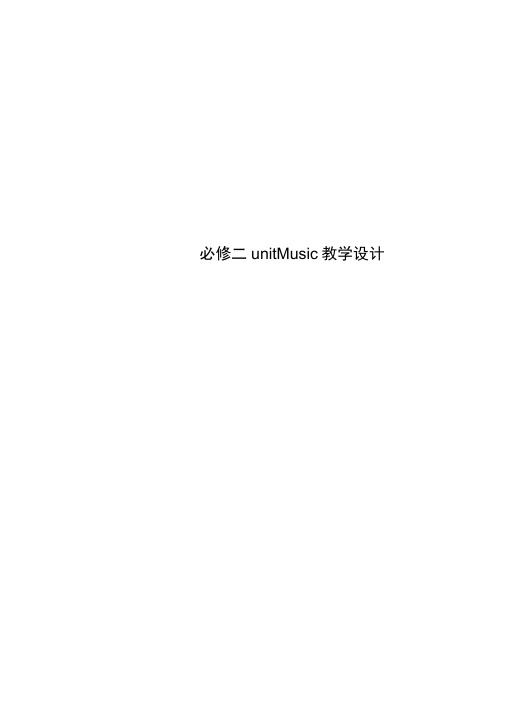
必修二unitMusic教学设计作者: 日期:高效课堂必修二Unit5 Music英语组一.课前准备1.学生的学习准备查找关于The Monkees的信息。
学生可以通过上网等形式搜集信息,为本课学习做准备。
这个预习任务提高了学生的学习兴趣,变被动学习为主动学习。
2.教师的教学准备教师应了解各种类型的音乐及其特点,深化对于音乐的认识和感受,提高音乐修养;详细了解美国知名乐队The Monkees的发展历史和他们的代表作学情分析高一学生已经掌握了略读、跳读等一定的阅读技巧以及识别关键词、确定主题句、预测等阅读技能,形成了初步的阅读技巧。
本课主题为音乐,学生对于这个话题比较感兴趣,学生求知欲比较旺盛,思维较活跃。
但大部分学生的基础知识仍然较为薄弱,运用英语进行交际活动的能力较差;主动学习的动力不够。
因此要设置他们感兴趣的学习活动,时刻给他们提供必要帮助,让他们投入到课堂活动中来。
学习目标知识目标1. Important words: folk musician pretendattach form passer-by earn extra in strume nt perform pub cash studio millionaire relybroadcast humorous familiar2. dream of to be honest attach…to play jokeson rely on be familiar with break up能力目标1强化略读、查读等阅读技能,训练通过寻找关键词,主题句等方法更快速并准确地确定文章的段落大意,理清文章的总体框架与脉络。
2、运用已经掌握的基本猜词技巧来猜测文章中的部分单词。
情感目标1 了解各种各样的音乐形式,深化对音乐的全面认识,从而提咼音乐修养,培养跨文化意识。
2、在小组合作互动中,增强团队协作精神。
3、通过学习门基乐队从“平民到明星”的过程,引发学生对“明星梦”的反思,让学生了解成功来之不易。
高中英语必修二unit5-music-阅读教案
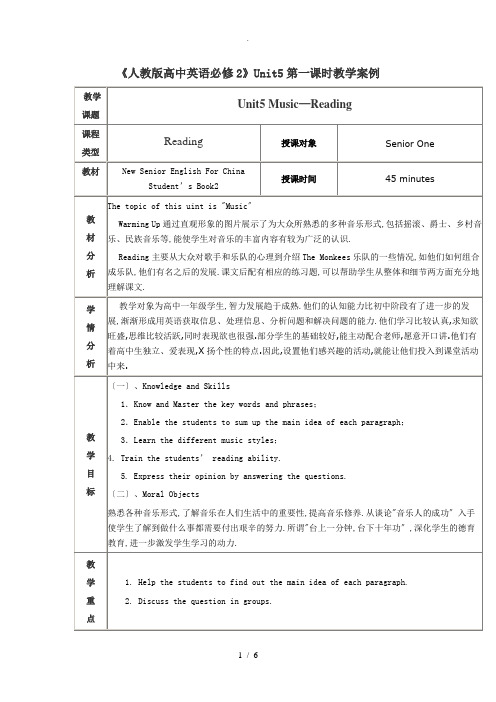
《人教版高中英语必修2》Unit5第一课时教学案例教学步骤一.Warming up——5minutes1. Attract students’ attentionPlay the song SUGAR. Talk about the "Importance of music〞with students to attract students’attention to the learning content, especially to mention the kind of music "Pop〞. Then lead students to the textbook on page34.2.Show picturesShow students some pictures about music styles and ask them to say something about theiropinions of different music.设计目的:放歌引出话题,可以吸引大家的注意力从而引导他们进入音乐这个课题,这样可以引起他们对该单元内容的兴趣并可以自然而然地引入到课文阅读.二.Pre-reading——8minutesTask one:Discussion and TalkingFour students in one group to discussionGive students some questions ask them to speak out1.Do you want to be famous?2.Please list the three steps of success.3.Do you know anything about the Monkees?设计目的:把学生分小组讨论有利于学生的合作学习能力的提高,这些问题起到过渡作用,能够顺利地进入到接下去的阅读阶段.三.While reading——20minutes。
高中英语必修二Unit5_Music教案

Unit5 Music [教学目标]:一、知识与技能一、知识与技能1、掌握话题语言的运用、就熟悉的音乐话题表达看法;2、了解各种各样的音乐形式,深化对音乐的认识;3、学会从一般文字资料中获取主要信息、思考话题背后的更深层次的内容,学会深入发掘和探讨。
会深入发掘和探讨。
二、过程与方法二、过程与方法1、听音乐,感受音乐风格;、听音乐,感受音乐风格;2、分组讨论、合作练习;、分组讨论、合作练习;3、结合所知,分类整理与归纳。
、结合所知,分类整理与归纳。
三、情感态度与价值观三、情感态度与价值观1、增添音乐欣赏趣味,提高音乐修养;2、懂得在日常交流中与他人分享各种学习资源、理解并尊重他人;3、培养合作精神和积极乐观的人生态度。
[教学重点]:1、掌握有关音乐的单词、熟练运用课文中所出现的重要词汇与短语2、学习由介词+which/whom引导的定语从句引导的定语从句3、进一步熟悉有关建议与偏好的表达方式[教具准备]:多媒体、音乐文件多媒体、音乐文件[课时分配]:1课时课时[教学过程]:Period 1 Warming up and reading Warming up “Keep Your Head Up”(抬起你的头),What would you like to do if you are free today? Task 1: Can you name any music style? Task 2: Do you know any famous bands in the world? Task 3: Skimming reading Read the passage quickly and match the general meaning of each paragraph. Main idea of each paragraph Paragraph 1: Dreaming of being a famous musician or singer. Paragraph 2: How the Monkees became serious about their business. Paragraph 3: How musicians form bands. Paragraph 4 How the band got their start. Scanning reading Para.2 How do people get to form a band? Members High school _________. Reasons They like to_________ and ________music. Places They _________their music in someone’s house. Forms They They may may play to_________ in the street or subway, and and give give give ______________ ______________ ______________ in in in pubs pubs pubs or or clubs. Results They can __________ some _____________ money. They hope to make records in a _____________and become________________. Para.3&4 Information about The Monkees. Began as _____________________ music & jokes based on ________________ after a year or so became serious in about 1970 ________________________ in the mid1980s ________________________ in 1996 a real band True or false 1. The writer believes that lots of people attach great importance to becoming rich and famous . 2. Some bands in American must start as a group of high school students. 3. It was" The Beatles" that started in a different way. 4. It was hard for the TV organizers to look for good rock musicians. 5. At first," The Monkees" didn't play their own songs. Summary If If we we we are are are __________ __________ __________ _________ _________ _________ ourselves, ourselves, ourselves, most most most of of of us us us have have have _________ _________ _________ _______ _______ being being famous sometimes in famous sometimes in our lives. Most musicians often meet and _________ a band. Sometimes they play in the street to ________________ so that they can earn some money and this also gives them a ___________ to realize their dreams. There was once a band started in a different way. The musicians of whom the band was was formed___________ formed___________ _____________ _______each _______each other other other as as as well well well as as as played played music, whose music and jokes were loosely __________ ___________ “The Beatles”. Their exciting performances were copied by other groups.“The Monkees” played their own instruments and wrote their own mu sic. Though it ____________ _________ in in 1970, 1970, 1970, it it it reunited reunited reunited in in in the the the mid-1980s mid-1980s mid-1980s and and and it it it is is is still still popular today. Task 4: Press conference 1. What kind of music do you like? Why 2. Which singer do you like best and why? 3. How does music make you feel? 4. How did your band start? 5. What are the differences between your band and others ? 6. Why did you change to sing your own songs? 7. What’s your future plan?Sample dialogue Journalist A Monkees MemberB A. What kind of music do you like, pop musi c or …?B. I like…, because…A. Who is your favorite singer? B. Well, I prefer /like… Why ? Her/his music makes me feel…A. How did your band start? B. We start as……What are the differences between your band and others ? We often play jo k es on …….kes on …….A. Why did you change to sing your own songs? B. Because…….A. What’s your future plan?B .We want to…….A. Thanks for your coming. B. You are welcome……Task 5: What do you think of “the Monkees”?Discuss in pairs using the adjectives that you think best describe them. 让学生进行重点词汇、让学生进行重点词汇、词组和句型的对话练习,词组和句型的对话练习,词组和句型的对话练习,时间允许的话我也会提问,时间允许的话我也会提问,时间允许的话我也会提问,使学使学生在真实的语言环境中自然地习得新的语言知识,进一步熟悉有关建议与偏好的表达方式。
《Music》教案2(人教版必修2).doc
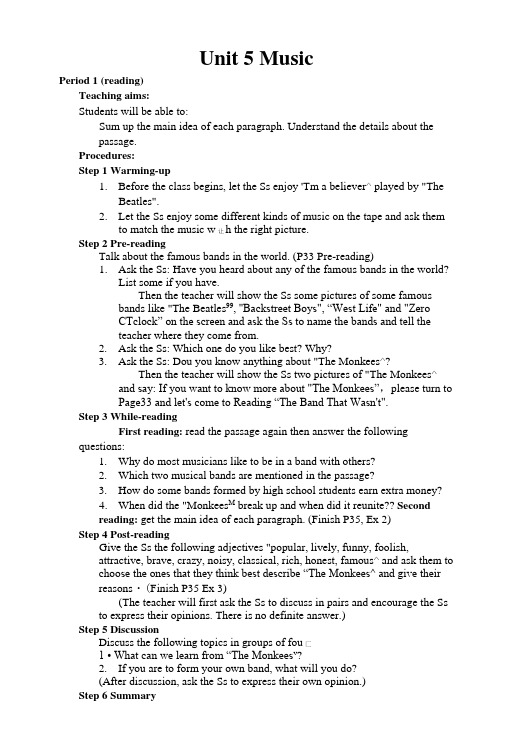
Unit 5 MusicPeriod 1 (reading)Teaching aims:Students will be able to:Sum up the main idea of each paragraph. Understand the details about thepassage.Procedures:Step 1 Warming-up1.Before the class begins, let the Ss enjoy 'Tm a believer^ played by "TheBeatles".2.Let the Ss enjoy some different kinds of music on the tape and ask themto match the music w让h the right picture.Step 2 Pre-readingTalk about the famous bands in the world. (P33 Pre-reading)1.Ask the Ss: Have you heard about any of the famous bands in the world?List some if you have.Then the teacher will show the Ss some pictures of some famous bands like "The Beatles99, ''Backstreet Boys", “West Life" and "ZeroCTclock” on the screen and ask the Ss to name the bands and tell theteacher where they come from.2.Ask the Ss: Which one do you like best? Why?3.Ask the Ss: Dou you know anything about "The Monkees^?Then the teacher will show the Ss two pictures of "The Monkees^ and say: If you want to know more about "The Monkees”,please turn toPage33 and let's come to Reading “The Band That Wasn't".Step 3 While-readingFirst reading: read the passage again then answer the following questions:1.Why do most musicians like to be in a band with others?2.Which two musical bands are mentioned in the passage?3.How do some bands formed by high school students earn extra money?4.When did the "Monkees M break up and when did it reunite?? Secondreading: get the main idea of each paragraph. (Finish P35, Ex 2) Step 4 Post-readingGive the Ss the following adjectives "popular, lively, funny, foolish,attractive, brave, crazy, noisy, classical, rich, honest, famous^ and ask them to choose the ones that they think best describe “The Monkees^ and give theirreasons・(Finish P35 Ex 3)(The teacher will first ask the Ss to discuss in pairs and encourage the Ss to express their opinions. There is no definite answer.)Step 5 DiscussionDiscuss the following topics in groups of fou匚1 • What can we learn from “The Monkees v?2.If you are to form your own band, what will you do?(After discussion, ask the Ss to express their own opinion.)Step 6 SummaryToday we have enjoyed some beautiful music and learn something about some famous bands. Remember:Success lies in hard work.Step 7 Homework1.Retell the text.2.Collect some information about your favorite music.Period2 (vocabulary& grammar)Teaching aims:Students will be able to:Use the important words and expressions from warming up and readingUse the attributive clause led by "prep. + which / whomProcedures:Step 1 Vocabulary study:1.Discover useful words and expressions2.Turn to page 35 and do exercises No. 1, 2 and 3 first. Check your answerswith your classmates'. (Finish P36 Ex 3)Step 2 Grammar study1.Underline five sentences in the reading passage that contain u prep.+which/ whom" attributive clauses.2.Discover the structure “prep.+which/ whoirT by sorting out the messagesplete the passage using attributive clauses(Finish P37 Ex 3)4.Play a game of definitions. P37 Ex 4.Period 3 (Listening,reading and talking)Teaching aims:Students will be able to:make suggestionstalk about preferenceProcedures:Step 1 Listening & Writing1.Preparation for listening to "Freddy, the frog^Read the directions and the statements. Make sure the students know what they mean and what they are asked to do.2.Turn to page 38 and read these sentences before listening to the tape.Then listen to the tape and decide true or false.Step 2 Reading1.Read more about Freddy's life and summarize the main idea of the storyin one sentence・(A possible version: this is a story about a band thatbecame famous and did not like it.)2.Underline all the useful expressions or collocations in the passage. Copythem to your notebook after class as homework.Collocations from Freddy?s life:become famous, visit Britain on a tour, wait for hours to get tickets forthe concerts, be confident, enjoy singing and all the congratulations, themost exciting experience, sing in a TV program called “Top of the Pops,wear an expensive suit, give a performance to a TV camera, go wrong,not go out without being followed everywhere, wear sunglasses, hide inrailway stations, one's personal life, become too painful for sb., packone^s bagsStep 3 Discussion1.In small groups imagine you are Freddy and his group and you are back atthe lake. Discuss the advantages and disadvantages of being famous. Askthem make a list of their ideas2.Ask some groups to act their conversations.Step 4 HomeworkDevelop your ideas into a short passage.Period 4 (speaking & writing )Teaching aims:Students will be able to:write a letter for advicetalk about music: forming a bandmake suggestions and talk about preference properlyProcedure:Step 1 Speaking (Group work)1.BrainstormDo you know what a band is? What is your favorite band? How many people is a band usually formed? ...2.speakingYou and your friends want to start your own band・However” you have never played in a band before・ Talk with your friends about the band youare going to start. What things do you have to consider? What problems doyou have?3.Activity and performanceImagine that you have a chance to form a band. How to form a band?According to the following information discuss in your group・1)What is name of your band?2)Who will play what instruments and who will sing?3)What kind of band you will be?4)Choose an English song for your “band" to perform.Step 2 WritingYou and your friends want to start your own band. However, you have never played in a band before. You write an e-mail to Freddy for his advice. The e-mail is started for you, but you have to finish it.Yoifd better do some brainstorming in small groups before writing your letters. You should follow the procedure for brainstorming and outliningintroduced in Module 1 Unit 2.Writing tips:1.In groups discuss some questions you would like to ask Freddy.1)Make a list of them and choose the best questions.2)Share your ideas with another pair; discuss all questions and then decidewhich ones you want to ask Freddy.3)Use each question to start a new paragraph.4)Write your question first; then add extra information to show Freddy whyyou need help.5)Finish the letter politely and thank Freddy for his help.2.Reading Freddy9s replyLet's read Freddy9s reply and answer the questions:… How was Freddy^s band formed?■一What advice does Freddy give?3.Writing a note and a paragraphPlease turn to page 74. Now in pairs you are going to decide on the best way to tell a foreign friend about one kind of Chinese folk music. What do you think they need to know before they can enjoy it? Why do you like it? Who are your favorite singers? Discuss it with your partner and write notes to remind you of your most important ideas.Step 3 Homework1.Write a paragraph telling your foreign friend about the type of Chinese folkmusic you have chose FL Use a dictionary and other reference books to helpyou.2.Finish off the summing up in Student's Book.。
2019统编人教版高中英语必修第二册unit 5《Music》全单元教案教学设计
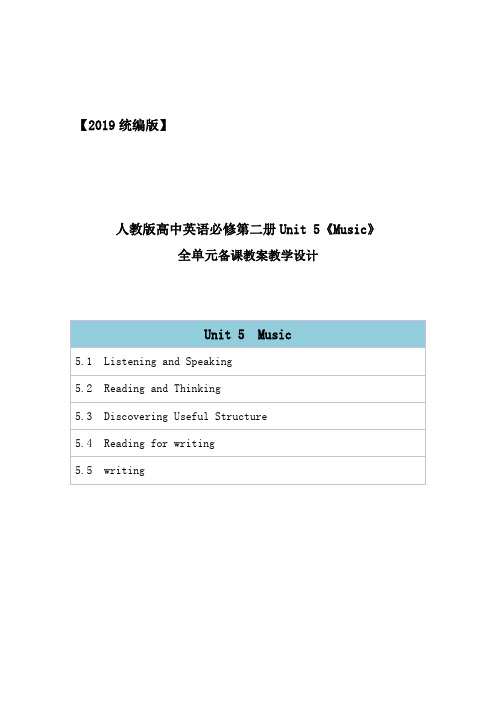
【2019统编版】人教版高中英语必修第二册Unit 5《Music》全单元备课教案教学设计Unit 5 MusicListening and Speaking【教学目标】1. Instruct students to get main facts by listening and motivate them to talk about the topics about music, the types of music, and how the music makes them feel.2. Develop students’ sense of cooperative learning and individual thinking capability.3. Develop students’ different listening skills to solve different listening comprehensive problems.4. Help students to understand how to use the structures “past participle as adverbial”.【教学重难点】Prompt students to talk about the related topics, such as types of music they know, their favourite type of music, how music makes them feel, and how to use past participle as adverbial.【教学过程】Step 1 Lead inThe teacher is advised to talk with their students about music.Boys and girls, before we listen, let’s work in pairs and discuss what type of music you know.Which type is your favorite? How does it make you feel? Share your ideas with partners.I know Chinese traditional music/classical music/country music/hip-hop/jazz/pop music/Latin music/rap/rock/punk…I like classical music. It makes me feel full of energy and happy.Step 2: PredictionAfter their small talk, the teacher can move on by finishing the following task: See the pictures and give the correct answers.1. What are the people doing in the picture below?2. Match the pictures with the correct types of music.A. Chinese traditionalB. classicalC. country musicD. hip-hop1_______________2_______________3_______________4_______________Step 3: Summary of the main ideaListeningI. Play the radio about The Sound of Music (音乐之声), and let students finish the following tasks.A star has come out to tell me1.___________________ to goBut deep in the dark-green shadowsAre voices that urge me to staySo I pause and I wait and I listenFor one more sound for one more lovely thing2.___________________ might say…The hills are alive with the sound of musicWith songs they have sung 3.__________________The hills fill my heart with the sound of musicMy heart 4.__________________ every song it hearsMy heart wants to beat like the wings of the birds that rise from the lake to the treesMy heart wants to sigh like the chime that flies from a church on a breezeTo laugh like a brook 5.__________________ and falls over stones in its wayTo sing through the night like a lark who is 6._____________I go to the hills when my heart is lonelyI know I will hear what I’ve heard beforeMy heart will 7.______________ the sound of musicAnd I’ll sing once moreII. The reporter paraphrased some of the answers the students gave him. Listen to the interviews again and complete the sentences with the words you hear.1. A: Country music touches my heart.B: So you like music that’s _______of _______?2. A: When I listen to hip-hop, I just have to move!B: So it makes you want to _______?3. A: Classical music makes me feel like I’m sitting beside a quiet stream and enjoying nature.B: So to you, it’s _______ and _______?Learning new wordsList the new words in the lesson, tell students the meaning of these words and give some examples.News words: classical, energy, soul…Talking projectGuide students to do speaking practice.I. Talk in pairs. Interview each other about music. Use the picture below for ideas.A: What kind of music do you like?B: I like techno music.A: What makes it so special to you?B: I like to listen to it when l exercise. It gives me energy.II. Work in pairs or groups and role play a conversation.●Suppose you are a reporter and interviewing the students who about music.➢I like to…➢Chinese traditional song/classical music/hip-hop music/country music…➢Listen to/play/sing…Unit 5 MusicReading and Thinking【教学目标】1. To acquire the basic usage of the new words and express concerning how computers and the Internet help us experience music.2. Enable students to understand the main information and text structure of the reading text.3. Enable students to understand past participle as adverbial.【教学重难点】1. Guide students to pay attention to reading strategies, such as prediction, self-questioning and scanning.2. To talk about the advantages and disadvantages of being a member of virtual choir.3. Lead students to understand past participle as adverbial;【教学过程】Step 1 PredictionAsk students the question.How can computers and the Internet help us experience music differently?Step 2: Learning new wordsLearn words:perform,enable,prove,award,and fall in love with…New words practiceIn order to have a good _______________ (perform), I have made good preparations for it.At present, developing the ___________ (able) of the students is an important task in our daily teaching activity.Step 3: Learning sentence patternsIntroduce the sentence patterns in the lesson and give some examples and explanation1. as 引导定语从句,意为“正如,正像”2. 过去分词(短语)作状语as引导定语从句的常用句式有:as is known to all 众所周知as we all know我们都知道as we can see正如我们所看到的as is reported正如报道的as is often the case这是常有的事as is mentioned above如上所述Step 4: Fast reading tasksGuide student to read the article quickly, teach some reading skills and do some exercises.Task of the first fast reading:Read quickly and figure out the key words of each paragraph.•Paragraph 1: enable•Paragraph 2: award•Paragraph 3: performanceTask of the second fast reading:1. What is mainly discussed in this passage?2. Which paragraph mentions background information about the virtual choir?3. Which paragraph mentions the conclusion of the virtual choir?Step 5: Careful reading tasksGuide student to read the article carefully and do some exercises.1. What is the attitude towards the virtual choir?2. Why does the virtual choir prove to be a good influence on the lives of many people?3. If you want to take part in a virtual choir, you need….Step 6: Study reading tasksAnalyze two difficult sentences in the text.1. Imagine having the opportunity to sing together with hundreds of other people while you are at home alone.2. A virtual choir enables them to add their voices to those of other individuals and become part of the global community.Step 7 Homework:Review what we have learned and find out the key language points in the text.Unit 5 MusicDiscovering Useful Structure【教学目标】1. Get students to have a good understanding the basic usage of past word segmentation as past segmentation as predicative and adverbial.2. Strengthen students’ great interest in grammar learning.3. Instruct students to express their ideas with this grammar correctly.【教学重难点】How to enable students to use the structure and meaning of past word segmentation as past segmentation as predicative and adverbial.【教学过程】Step 1 Lead-inGive some messages and ask students to guess who she is.英语过去分词的句子。
高一英语(人教版)-必修二 Unit 5 Music (2)-1教案

高一英语(人教版)-必修二 Unit 5 Music(2)-1教案教案教学基本信息:课题:虚拟合唱团学科:英语教材:人教版高一英语必修二Unit 5 Music (2)教学设计参与人员:设计者、实施者、指导者、课件制作者、其他参与者教学目标及教学重点、难点:重点:获取梳理文中作者所提供的有关虚拟合唱团的事实性信息;概括整合虚拟合唱团的关键特征并与真实合唱团进行比较;难点:以思维导图的形式梳理文章篇章结构并分析作者的态度;结合生活谈论自己对虚拟合唱团的看法和观点。
教学过程:教学环节主要教学活动设置意图导入话题 - 激活学生的已知 - 引出本课主题教师创设情境,导入话题:为什么人们需要音乐?人们如何体验音乐?电脑和网络如何帮助我们体验不同的音乐。
预读 - 预测文章大意 - 研究生词教师介绍文章标题《The Virtual Choir》,学生根据文章标题和插图,预测文章大意,并解释生词。
整体阅读 - 确认文章大意 - 梳理文章结构学生通读全文,梳理文章大意,并梳理文章结构。
细节阅读 - 获取事实性信息 - 概括关键特征学生细读文章,获取有关虚拟合唱团的事实性信息,并概括整合虚拟合唱团的关键特征。
比较分析 - 比较虚拟合唱团与真实合唱团 - 分析作者态度学生比较虚拟合唱团与真实合唱团的不同点,并分析作者的态度。
拓展讨论 - 结合生活谈论观点 - 思维导图梳理文章结构学生结合生活谈论自己对虚拟合唱团的看法和观点,并以思维导图的形式梳理文章结构。
教案教学基本信息:课题:虚拟合唱团学科:英语教材:人教版高一英语必修二Unit 5 Music (2)教学设计参与人员:设计者、实施者、指导者、课件制作者、其他参与者教学目标及教学重点、难点:重点:获取关于虚拟合唱团的事实性信息;概括整合虚拟合唱团的关键特征并与真实合唱团进行比较;难点:以思维导图的形式梳理文章篇章结构并分析作者的态度;结合生活谈论自己对虚拟合唱团的看法和观点。
人教版英语必修二Unit5Music教案4
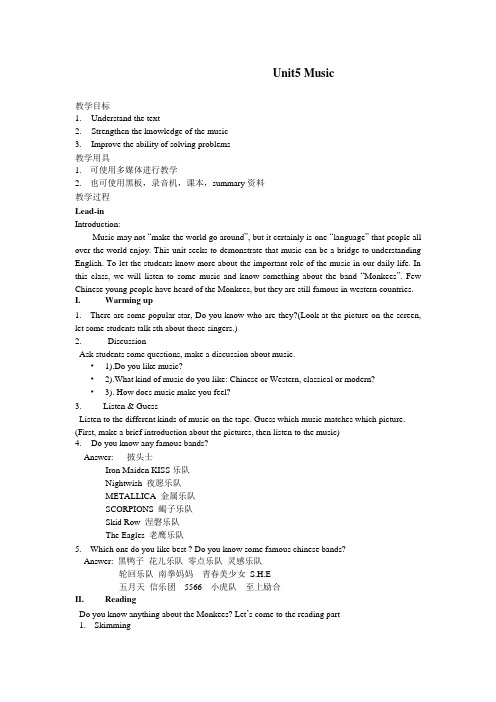
Unit5 Music教学目标1.Understand the text2.Strengthen the knowledge of the music3.Improve the ability of solving problems教学用具1.可使用多媒体进行教学2.也可使用黑板,录音机,课本,summary资料教学过程Lead-inIntroduction:Music may not “make the world go around”, but it certainly is one “language” that people all over the world enjoy. This unit seeks to demonstrate that music can be a bridge to understanding English. To let the students know more about the important role of the music in our daily life. In this class, we will listen to some music and know something about the band “Monkees”. Few Chinese young people have heard of the Monkees, but they are still famous in western countries.I.Warming up1. There are some popular star, Do you know who are they?(Look at the picture on the screen, let some students talk sth about those singers.)2. DiscussionAsk students some questions, make a discussion about music.•1).Do you like music?•2).What kind of music do you like: Chinese or Western, classical or modern?•3). How does music make you feel?3. Listen & GuessListen to the different kinds of music on the tape. Guess which music matches which picture. (First, make a brief introduction about the pictures, then listen to the music)4.Do you know any famous bands?Answer:披头士Iron Maiden KISS乐队Nightwish 夜愿乐队METALLICA 金属乐队SCORPIONS 蝎子乐队Skid Row 涅磐乐队The Eagles 老鹰乐队5. Which one do you like best ? Do you know some famous chinese bands?Answer: 黑鸭子花儿乐队零点乐队灵感乐队轮回乐队南拳妈妈青春美少女S.H.E五月天信乐团5566 小虎队至上励合II.ReadingDo you know anything about the Monkees? Let’s come to the reading part1.SkimmingLet’s read the text for the first time, and find out how the group “The Monkees”become popular.Answer : They become more serious about their work and started to play their own instruments and write their own songs like a real band . They produced their own records and touring and playing their own music, so they become more popular.2.Intensive readingJoin the correct parts of the sentences together according the text, match the number with the letter properly.• 1.They produced a new record in1996• 2.Most musicians get together and• 3.the first TV show• 4.However, the band broke up about 1970• 5.However,the band broke up about1970.•• A. but only one person was accepted.• B. but reunited in the mid-1980s.• C. from a band because they like to write and play music.• D. to celebrate their time as a band.• E. was a big hit.Answer: D.C.A.E.B3.Deep ReadingReading it again, look for the main idea of each paragraphMain idea:1).________________________________________2)_________________________________________3)_________________________________________4)_________________________________________Answer:1). Many people want to be famous as singers or musicians2). How most bands start3). The Monkees started in a different way4). How the Monkees popular and how they developed as a real band.Find sentences in the text taking place of the following sentences1).honestly, someone consider the fame to be more important than others.2).They made a new record to celebrate their time when they were a real band.3).but after a year, when they took their work more seriously, “The Monkees”began playing instruments of their own and writing songs as a real band.Translate the sentences into Chinese1).The musicians were to play jokes on each other as well as play music, most of which was based loosely on the Beatles.2).So during the broadcasts they just pretended to sing.3).Sometimes they may play to passer-by in the street or subway so that they can earn some extra money for themselves or to pay their instruments.4. Listen to the tapeLet’s listen to the tape , and fill the blanks in the summary•_____(诚实的说),a lot of people_____great importance to become rich famous.Many times in ____,bands are formed by high school students, who may play to ______ in the street. Later they may give performances in ___or ___,for which they are paid in ____,But the “monkees”starts in a different way. The musicians of the band _______on each other ____played music. Anyhow their performances were ______ enough to be ___by other groups. The band ______ in about1970. but ___ in the mid-1980sAnswer:To be honest,attached, America, Passers-by, street, subway, cash, played jokes, as well as, humorous, copied, broke up, reunited.We have known more about The Monkees, let’s listen to a music from themIII.Homework1. Find the music in our daily life and think about the functions of music.2. Retell the summary3. Underline the phrases in the text板书设计I.Leading inII.Warming upIII.Reading1.Skimming2.Intensive reading3.Deeping reading4.Listen to the tapeIV.Homework(也可参照教学课件,是用多媒体进行教学)教学反思音乐本身就是培养英语学习热情,练习英语的好途径,学生对此话题也很感兴趣,教师应该充分利用本节课调动学生的积极性,从各个方面对学生进行锻炼。
高中英语外研版必修二Module3《music》教案
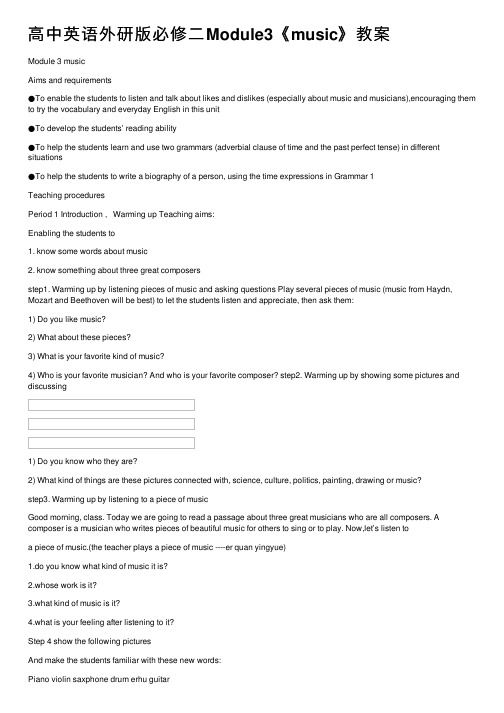
⾼中英语外研版必修⼆Module3《music》教案Module 3 musicAims and requirements●To enable the students to listen and talk about likes and dislikes (especially about music and musicians),encouraging them to try the vocabulary and everyday English in this unit●To develop the students’ reading ability●To help the students learn and use two grammars (adverbial clause of time and the past perfect tense) in different situations●To help the students to write a biography of a person, using the time expressions in Grammar 1Teaching proceduresPeriod 1 Introduction ,Warming up Teaching aims:Enabling the students to1. know some words about music2. know something about three great composersstep1. Warming up by listening pieces of music and asking questions Play several pieces of music (music from Haydn, Mozart and Beethoven will be best) to let the students listen and appreciate, then ask them:1) Do you like music?2) What about these pieces?3) What is your favorite kind of music?4) Who is your favorite musician? And who is your favorite composer? step2. Warming up by showing some pictures and discussing1) Do you know who they are?2) What kind of things are these pictures connected with, science, culture, politics, painting, drawing or music?step3. Warming up by listening to a piece of musicGood morning, class. Today we are going to read a passage about three great musicians who are all composers. A composer is a musician who writes pieces of beautiful music for others to sing or to play. Now,let’s listen toa piece of music.(the teacher plays a piece of music ----er quan yingyue)1.do you know what kind of music it is?2.whose work is it?3.what kind of music is it?4.what is your feeling after listening to it?Step 4 show the following picturesAnd make the students familiar with these new words:Piano violin saxphone drum erhu guitarste p4.now please match these musical instruments with their names.Step 5 work in groups to discuss these questions:1.which of the instruments do you like listening to?2.which famous musicians play them?3.is the chinese instruments different from the otherinstruments?describe the difference,if there is one.Step6 summary and homework:Today we’ve learnt the Introduction,know something about music,and we’ve also learnt some new words.The homework:1.Try to instruct your favorite musician to your class orally.2.Learn the new words again, using the dictionary if necessaryPeriods 2 Reading and VocabularyTeaching Aims:Train the students' reading ability.Learn some useful words and expressions.Teaching Important Points.Help the students to understand the passage better.Learn and master some important words and phrases in this period. Teaching Difficult Points:How to help the students improve their reading and understand the passage better.Teaching Methods:Fast reading to get the general idea of the text.Careful reading to understand the passage better.Discussion to help the students understand what they've learned better. Teaching procedure.Step 1 Lead --inThe teacher may play a kind of music written by Beethoven.------- What kind of music do you think it?----- Who do you know wrote it ?The teacher may discuss the questions and answer them freely.T: As we know, there are various kinds of music around the world. They all have their own obvious characteristic. And also there were famous composers such as Joseph Haydn, Mozart, and Beethoven. Today we may learn of their life from the text. Step 2 Reading comprehension.Fast reading: Read the passage quickly and choose the best title.A.Three Great Austrian Composers.B.Three Great Composer of the eighteenth Century.C.Three Great Child Composers.Key: B.Now let's read the passage again, underline new words in the text and decide whether the following statements are right or not.1.The three composers were all born in Austria.2.Mozart had a beautiful singing voice.3.Mozart died before his fortieth birthday.4.Beethoven once worked at the court of a prince, who began to go deaf when he grew older.5.Beethoven had ever met Haydn, but he didn't think he taught him a lot.6.Both Haydn and Mozart had fathers who were musicians.Key:1.F Beethoven was born in Bonn, Germany.2.F. Haydn had a good singing voice.3.T4.F. Haydn once worked at the court of a prince, but he didn't go deaf.5.T6.F. Haydn was the son of a peasant( The teacher may begin with the T/F questions orally and this is a good time to test their listening abilities as well as their comprehension of the text. )Step 3 Read and listen to the passage. Meanwhile, some more questions are waiting for you.1.How did Haydn change the form of symphonies?2.How long did he work in eastern Austria?3.How many pieces of music did Mozart compose?4.How old was he when he played for the Empress of Austria?5.How long were Mozart and Haydn friends?6.Who taught Beethoven how to play the piano?7.Did he stop composing when he became deaf?Keys:1 He changed the symphony into a long piece for a large orchestra.2. 30 years.3.More than 600 pieces of music.4. When he was 6 , he played the harpsichord in a concert for the Empress of Austria.Periods 3, Function and GrammarTeaching aims:1 To learn grammar rules2 To use the grammar rules for correctcommunication3 To study co-operatelyTeaching important points: To use the correct tense and theproper conj.Teaching difficult points:To use correctly the two tenses andthe three conj.Teaching methods: Explanation and practiceTeaching procedure:Step Ⅰ Lead-in by telling the class what happened to the Shenzhou Ⅻand technology is developing rapidly, China hasachieved a lot in the area of.Shenzhou Ⅻscientists,engineers and the whole nation were waiting andI couldn’t help getting exciteed. I feel proud of our country. Step Ⅱ Grammar 11 Make sentences with “when , while, come in , have a lesson” ( Here is a picture of a classroom and a student coming in)A When he came in, we were having a lesson.B When we were having a lesson, he came in.C While we were having a lesson, he came in.2 Say the meaning of “as” in the following sentences.D As he was a child, he studied drawing.E As he grew older, he began to go deaf.F He listened to music as he walked.当…之时随着⼀边…⼀边…3Answer the three questions.When we talk about a single event in the past,we use when asin A .When we talk about a period of time in the past,we use when/ while/ as as in B C D.We use as to refer to a progressive change as in E F .4PracticeComplete the following sentences with “when ,while , as”(1) ___she was studying at school, she also sang in the schoolchoir.(2) ___he was living in Vienna, he studied music.(3) ___she met bach,she was only 20 years old.(4) ___he grew older, he found it more difficult to compose music(5) ___he was playing in the orchestra, he met his wife.(6) ___he was working in Hollywood, he became ill and died.(7) ___I listened to the violin solo, I fell in love withclassical music.(8) ___they toured Europe for 10 years, they finnally decidedto live in Austrilia.Step Ⅲ Grammar 2 The past perfect tense1Read the following sentences and summarise rules, paying attention to tenses. Fill in the blanks.After Liping had finished doing his homework, he turned on the TV. After they had got everything ready, they began to do the experiment.Before he came to our school, he had taught English for several years. Before his letter reached me, I had received his telephone call.They had finished the project by last month.I had left the country by the time the letter reached me.had done before diddid after had donehad done by did/past time2 PracticeWorkbook Grammar (2)(3)(4)Complete the sentences using the verbs in brackets and the past simple or past perfect tense.StepⅣ1 Game Oral practice ,pair work.Ask and answer questions using all kinds of tenses.Example:-- When did you have your breakfast this morning?-- At 6.-- Have you prepared for the English lesson?-- Yes, I have. I have finished the exercises in the workbook.2 Watch a vedio play.Step Ⅴ Sum upAsk some students to make sentences using “when, while, as, before, after, by”.Step Ⅵ Homework: Present a biography of a famous Chinese musician orcomposer.Periods 4 Speaking and Writing Teaching Aims:1.Knowledge and Skilla.To develop speaking ability by talking about likes and dislikes.b.To learn about some vocabulary and knowledge related to music and composers.c.To develop writing ability by presenting a biography of a famousChinese musician or composer.d.Train the ability of collecting and dealing with information, anddevelop their abilities of getting new information, communication and cooperation.2.Emotion and Valuesa.To raise students’ interests in science and form the right attitudetowards all kinds of music.b.To help them know Chinese traditional music well and cultivate theirinterest in playing some Chinese instrument.3. Character-building:a.To make them know how to enjoy different kinds of music.b.Arouse their interest of playing some kinds of instrument and enrichtheir leisure time.4. Cross-cultural awarenessa.To help them know the difference between China and some westerncountries in instruments.b.Cultivate their awareness of cultural communication through thespecial language—music.Difficulties and Importance:a.To make the students understand and grasp the vocabulary andknowledge related to music.b.To enable the students to know how to use adverbial clause of time. Teaching Method: a.Task-based methodology/doc/505938019.htmlmunicative ApproachTeaching Procedures:Step 1 Pre-readingLook at the picture and answer the following questions.1.Who is he?2.Have you ever know something about him?Step 2 While-readinga. SkimmingRead the passage quickly, and make a note of some basic information about Ye xiaogang.Suggested answers:b. Detailed readingRead the passage carefully and fill in the blanks with proper words. Find what Ye Xiaogang did or what happened to him in the following years:Suggested answers:Step 3. Post-readingDiscussion.1.Are there any similarities between Ye Xiaogang and the Europeancomposers you have read about in this module?2.Do you think it is a good idea to mix Chinese and western music? Step 4 Everyday Englisha. Listen to two people talking about the way they listen to music and answer the questions.1.How do they listen to it?2.Are they happy with the way they listen to music?3.What does Anna offer to do for Tom?b. work in pairs. Discuss your favourite music and how you listen to it. Step 4 Guided writingWrite a short passage of a famous singer in China—Han Hong.The following words may help you:1. sing well successful song writer2.born in1971 in Tibet(西藏)3. young watch her mother sing and dance4. at the age of nine professional(专业的) training in Beijing.5. in 1985 her first national prize6. write songs in 19937. song Hometown number one in ChinaHomework:1.Finish writing the biography of Han Hong—a famous Chinese singer.2.Finish other exercises in this module.Periods 5 culture cornerTeaching aims:Enabling the students to1. to know sth about Ye Xiaogang2. write a biography of a famous Chinese musician or composer.Teaching steps:I. Ask some students to say something about Mozart.Give as many details as possible.II. Try to think of a Chinese musician or composer, eg. Xu Peidong.Gather these materials.1. when, where and in what kind of family he/ she was born.2. how he/ she spent his/ her childhood or youth.3. about his/ her education4. what are his/ her famous works5. what his/ her style is / wasGroup work. Ask the students to discuss about the musician or composer.Then ask some students to stand up to say sth. about the musician or composer.Correct the mistakes if any.III. Cultural Corner.Ye Xiaogang1. Listen to the passage and try to find the answer to this question: When did his album Horizon appear? (in 1986)2. Read the passage thoroughly and make a note of the information about Ye Xiaogang.Name:_________________ Sex: __________________Nationality:_____________ Job:___________________Main achievements: ____________________________________________Style of music: ____________________________What he did or happened to him in the following years:1955: ___________________________________________From 1978 to 1983: ___________________________________________1985: ___________________________________________1986: ___________________________________________1996: ___________________________________________3. Check the answers with the whole class. Then ask one or two students to say sth about Ye Xiaogang with the help of the notes made.4. Language points:1) work as2) leading modern composers 主要作曲家leading article 社论the leading cause 主要原因a leading role 主⾓3) mix A with B= mix A and B togethermix win with waterNever mix with such people.mix up 弄混,弄错It’s common to mix him up with his brother.弄乱mix up the papersmix up those data4) receive many prizes5) part ofIV. Homework:Write a short passage about the Chinese musician or composer we talked about this period.。
高中英语必修二music教案
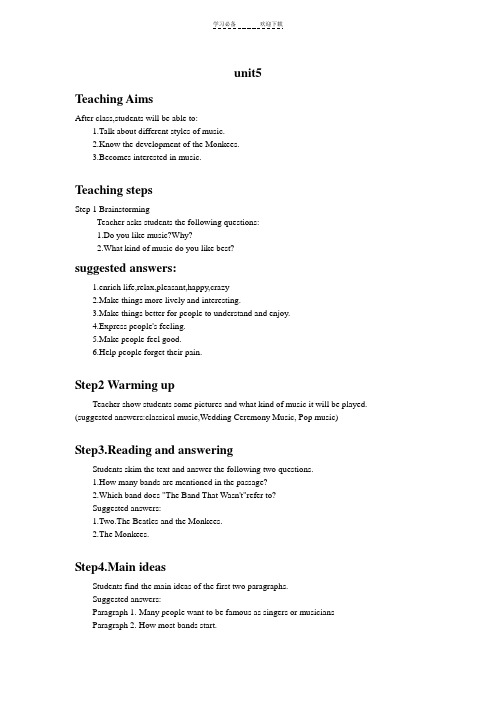
unit5Teaching AimsAfter class,students will be able to:1.Talk about different styles of music.2.Know the development of the Monkees.3.Becomes interested in music.Teaching stepsStep 1 BrainstormingTeacher asks students the following questions:1.Do you like music?Why?2.What kind of music do you like best?suggested answers:1.enrich life,relax,pleasant,happy,crazy2.Make things more lively and interesting.3.Make things better for people to understand and enjoy.4.Express people's feeling.5.Make people feel good.6.Help people forget their pain.Step2 Warming upTeacher show students some pictures and what kind of music it will be played. (suggested answers:classical music,Wedding Ceremony Music, Pop music)Step3.Reading and answeringStudents skim the text and answer the following two questions.1.How many bands are mentioned in the passage?2.Which band does "The Band That Wasn't"refer to?Suggested answers:1.Two.The Beatles and the Monkees.2.The Monkees.Step4.Main ideasStudents find the main ideas of the first two paragraphs.Suggested answers:Paragraph 1. Many people want to be famous as singers or musiciansParagraph 2. How most bands start.Step5.Group workSteps6.Main ideasTeacher ask students the main ideas of the last two paragraphs.Paragraph 3. The Monkees started in a different way.Paragraph 4. How did Monkees developed.Step7.Reading and thinkingStudents look at the screen and find some information about time.Most of us have dreamed of being famous and form a band. Most musicians meet and form a band because they like to write and play music. Many times in America, bands are formed by high school students.They may play to passers-by in the street or subway, so that they can earn some extra money.However, there was one band that started in a different way, such as the Monkess band. When they play music,they played jokes on each other. Their music and jokes are based on the band called Beatles. After one year or so, they became more serious about their work. They started to play their own instrument and write their own songs like a real band.The band broke up in about 1970 , but reunited in the mid-1980s.In 1996,they produced a new record to celebrate their former time as a band.Step8.Students answer two questions:1.What did the Monkees do before they did not take music seriously.2.What did the Monkees do before they did take music seriously.Suggested answers:1.Pretended to sing.Sang songs by others.2.Sang their own songs.Produced their own records.Step9.True or False1.Many musicians form a band because of their common interest in music.2.Playing music to passers-by in the street is the first step to fame3.When perfomers make records and sell millions of copies,they are successful.4.Each week the group that was called"the Beatles"5.Most of us have dreamed of being a famous musian.6.It is hard for the TV organizers to look for good rock musians.7.At first,the Monkees did not play their own songs.8.The Monkees became even more popular thanthe Beatles.9.In 1996,they produced a new record to celebrate their former time as a band.Step10.HomeworkMake a summary of the passage.Have you ever wanted to be part of a band as a famous singer or musician? Have you ever dreamed of playing in front of thousands of people at a concert, at which everyone is clapping and appreciating your music? Do you sing karaoke and pretend you are a famous singer like Song Zuying or Liu Huan? To be honest, a lot of people attach great importance to becoming rich and famous. But just how do people form a band?Many musicians meet and form a band because they like to write and play their own music. They may start as a group of high-school students, for whom practising their music in someone's house is the first step to fame. Sometimes they may ptey to passers-by in the street or subway so that they can earn some extra money for themselves or to pay for their instruments. Later they may give performances in pubs or clubs, for which they are paid in cash. Of course they hope to make records in a studio and sell millions of copies to become millionaires!However, there was one band that started in a different way. It was called the Monkees and began as a TV show. The musicians were to play jokes on each other as well as play music, most of which was based loosely on the Beatles. The TV organizers had planned to find four musicians who could act as well as sing. They put an advertisement in a newspaper looking for rock musicians, but they could only find one who was good enough. They had to use actors for the other three members of the band.As some of these actors could not sing well enough, they had to rely on other musicians to help them. So during the broadcasts they just pretended to sing. Anyhow their performances were humorous enough to be copied by other groups. They were so popular that their fans formed clubs in order to get more familiar with them. Each week on TV, the Monkees would play and sing songs written by other musicians. However, after a year or so in which they became more serious about their work, the Monkees started to play and sing their own songs like a real band. Then they produced their own records and started touring and playing their own music. In the USA they became even more popular than the Beatles and sold even more records. The band broke up about 1970, but happily they reunited in the mid-1980s. They produced a new record in 1996, with which they celebrated their formal time as a real band.。
- 1、下载文档前请自行甄别文档内容的完整性,平台不提供额外的编辑、内容补充、找答案等附加服务。
- 2、"仅部分预览"的文档,不可在线预览部分如存在完整性等问题,可反馈申请退款(可完整预览的文档不适用该条件!)。
- 3、如文档侵犯您的权益,请联系客服反馈,我们会尽快为您处理(人工客服工作时间:9:00-18:30)。
必修二unitMusic教学设计
————————————————————————————————作者:————————————————————————————————日期:
高效课堂
必修二Unit5 Music
英语组
一.课前准备
1.学生的学习准备
查找关于The Monkees 的信息。
学生可以通过上网等形式搜集信息,为本课学习做准备。
这个预习任务提高了学生的学习兴趣,变被动学习为主动学习。
2.教师的教学准备
教师应了解各种类型的音乐及其特点,深化对于音乐的认识和感受,提高音乐修养;详细了解美国知名乐队The Monkees的发展历史和他们的代表作。
学情分析
高一学生已经掌握了略读、跳读等一定的阅读技巧以及识别关键词、确定主题句、预测等阅读技能,形成了初步的阅读技巧。
本课主题为音乐,学生对于这个话题比较感兴趣,学生求知欲比较旺盛,思维较活跃。
但大部分学生的基础知识仍然较为薄弱,运用英语进行交际活动的能力较差;主动学习的动力不够。
因此要设置他们感兴趣的学习活动,时刻给他们提供必要帮助,让他们投入到课堂活动中来。
学习目标知识目标
1.Important words: folk musician pretend
attach form passer-by earn extra instrument
perform pub cash studio millionaire rely
broadcast humorous familiar
2.dream of to be honest attach…to play
jokes on rely on be familiar with break
up
能力目标1、强化略读、查读等阅读技能,训练通过寻找关
键词,主题句等方法更快速并准确地确定文章的段落大意,理清文章的总体框架与脉络。
2、运用已经掌握的基本猜词技巧来猜测文章中的
部分单词。
情感目标1、了解各种各样的音乐形式,深化对音乐的全面
认识,从而提高音乐修养,培养跨文化意识。
2、在小组合作互动中,增强团队协作精神。
3、通过学习门基乐队从“平民到明星”的过程,
引发学生对“明星梦”的反思,让学生了解成功来之不易。
教学重点1、获取The Monkees乐队发展历程的信息;
2、培养学生掌握、理解文章细节的阅读能力;
3、帮助学生在体验中提高与人合作的能力。
教学难点1、通过阅读培养各种阅读技巧;
2、训练用英语获取信息、处理信息、分析问题和
解决问题的能力。
教学策略
遵循情景交际原则和任务型教学法,让学生在交际和完成实际任务过程中和提升对知识的运用能力。
遵循启发式教学原则,充分发挥学生的主体地位。
强调“主体参与、自主学习、协作交流”为中心,激发学生发现问题,培养学生解决问题的能力。
学法指导1、通过skimming抓住文章的主旨,通过
scanning理解文章细节。
2、讨论法和自主探究学习法。
二.教学过程设计与分析
教学活动学生活动媒体设计思路
应用
效果与评价
创设情境
Lead in
课前播放英文歌曲What doesn’t kill you makes you stronger. 学生听歌曲创造教学情境,带
学生进入音乐殿
堂,为教学的顺利
展开创造条件
音乐情境的设置,
有助于激发学生
对课堂的兴趣,帮
助教学直接进入
主题
Warming up
1、提出问题:How
many kinds of
music do you
know?
2、Guess game
播放八段不同
种类的音乐3、教授三个新
词:folk,
orchestra,
choral
4、出示问题What kind music do you like? How does music make you feel? Do you know any famous bands? Which one do you like best? Why?
5.必要时出示目标用语
I prefer…
Why do you prefer…
I like ...best because (I)
hate….
My favorite singer is… I enjoy 学生回答问题
学生将音乐和对
应的名称对应搭
配
学生结对
pair work
进行对话练习,两
到三组展示
学生可以利用出
示的目标用语进
行对话练习
激活学生已有的
信息,使学生具备
摄入新知识的心
理定式
不同的音乐形式,
深化学生对音乐
的全面认识
遵循交际法原则,
让学生在对话的
过程中,使用本课
目标语言进行交
际,达到学以致用
的目的,后两个问
题的提出用语引
出下个教学环节-
乐队
降低难度,为部分
学习基础薄弱的
同学提供帮助
本问题有利于激
活学生已有知识,
绝大部分同学都
有话可说,课堂气
氛活跃
音频有利于增强
课堂的趣味性,全
体学生的学习热
情得以激发
学生全员参与,积
极性较高,充分体
现了学生的自主
地位
listening to…
I am fond of (I)
don’t like… very much.
展示部分乐队图片学生观看图片
引出Reading
The band that
wasn’t
Reading
1、出示阅读
题目
2、Fast
reading
出
示
lea
rni
ng
tip
s(
学
法
指
导)
,让
学
生
归
纳
段
意3、Careful
reading,
出示设置
的阅读细
节题目学生读题目猜测
课文大概内容
学生快速阅读
学生分段阅读,利
用scanning方法,
迅速解决提出问
题
在学习中借助标
题和图片等信息
对课文进行预测
旨在对学生进行
学法指导,培养学
生快速阅读以抓
住文章主旨大意
借助所设置的问
题,培养学生搜集
信息,分析信息的
能力
学生在预测后,急
于进行阅读,来验
证自己的的预测,
学习积极性提高
学生自主阅读,有
了方法指导,迅速
归纳每段的主旨
大意
大部分同学能有
意使用阅读技巧,
完成教师的设问
自主协作
学生小组活动,本组内交换问题,解决问题学生分成小组讨
论文本中遗留问
题,小组内先进行
讨论解答,解答不
了,可以向其他组
的同学或老师求
助
学生学会自己自
己解决问题,在自
我探索中培养学
生质疑,解疑的能
力,并养成团结协
作的精神
多数学生都能在
自己的小组内发
言,参与意识强,
能很快通过小组
协作解答自己的
问题
文本升华
总结The Monkees 的成名经历,提出问题
What can we learn from Monkees? What is the most important thing for a successful band? Why?学生思考回答问
题
通过对成功的乐
队应具备的条件
的思考,有利于激
发学生对音乐更
本质更理性的认
识
学生都能通过思
考,认识到努力才
是成功的关键
思维拓展(时间允许的情况下出示)提出更深层次的问题
There are many talent shows on TV, for example I’m a singer and the Voice
of China. What do you think of the shows
and being famous overnight? 学生可通过同伴
讨论,也可独立思
考回答问题
本环节主要帮助
学生树立正确的
价值观。
对于目前
选秀节目泛滥的
情况,少数同学会
有走捷径获得成
功的思想。
针对这
点,让学生认识
到,节目选修可能
只是给普通人搭
建了一个平台,但
要获得真正的成
功,还得坚持不懈
的努力,否则,暂
时的荣誉就会如
昙花一现。
学生总结本篇文
章,再结合生活实
际,反思“明星
梦”,树立正确的
成功观和价值观。
Homework
Free writing(自由写作):学生根据本课内容,写一篇和音乐、歌手或乐队相关的文章,简介或发表自己对音乐或乐队的看法均可,不少于200词。
学生写一篇和本
课相关的文章
学生通过自由写
作,运用本课所有
涉及的内容及表
达,提高学生表达
的流畅性
多数学生能够就
本课所学、多说、
所读及所思进行
表达
三.课后反思。
